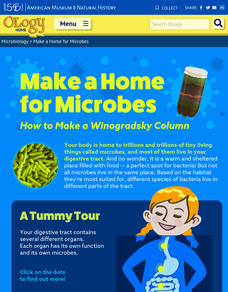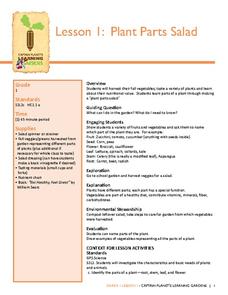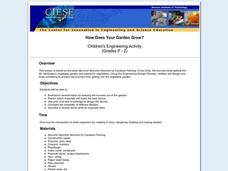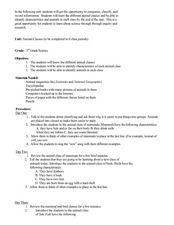TED-Ed
Bringing a Pop-up Book to Life
Breath life into the pages of a text with this instructional video on creating pop-up books. From choosing a topic, through the planning and creation phases, this video examines how to develop engaging visual...
Twisty Noodle
My Bug Book
Practice colors and bugs with a cute mini-book. Kids follow the instructions on each page to color different bugs the correct color, and then fill in the blank to describe their own bug.
Captain Planet Foundation
George Washington Carver and the Sweet Potato
Learn about George Washington Carver's important contributions to agriculture by studying the sweet potato. First graders read about the inventor's observations and prepare sweet potato slips for the class garden. Additionally, they...
American Museum of Natural History
Make a Home for Microbes
Make a Winogradsky Column to discover how microbes live within the digestive tract. First, participants take a tour of the stomach. Then, gather supplies and start building using a variety of materials. Over eight to 10 weeks,...
Scholastic
Make Hooting Owls with Your Class!
Kids create their own hooting owls using the template provided and art supplies. Pair the activity with the book, 10 Hooting Owls as suggested here, or on its own as part of a unit on owls or nocturnal animals.
NASA
Write the Book on Weather Metrics
It's not easy to measure the weather. Pupils learn about what all weather has in common—the atmosphere. Scholars discover how a meteorologists must be able to measure aspects of the atmosphere and decipher the data. They then create a...
Curated OER
Laura Joffe Numeroff "If You Give..." Book Activities
Have learners choose activities to complete based on the books by Laura Joffe Numeroff. They are introduced to If You Give a Mouse a Cookie and the other books in this series through prereading activities. They then construct a portfolio...
Curated OER
2nd Grade - Act. 28: Calendar & Weather Book
Second graders will track the weather patterns throughout the school year. This project spans the school year and takes five minutes per day or less. Measuring, data collection, and predictions are all explored throughout this relevant...
Captain Planet Foundation
Plant Parts Salad
How are vegetables beneficial to a healthy diet? Have kids examine different types of vegetables, such as zucchini, broccoli, and carrots, and determine which parts of the plant they represent. Then, they taste the vegetables as a...
Curated OER
Rockin' Picture Books
Learners demonstrate their knowledge of the rock cycle by creating picture books.
Walt Disney Company
Disaster Preparedness Activity Book
Join the American Red Cross as well as Mickey and friends as they help to prepare young scholars for natural disasters. After reading brief informational passages about earthquakes, floods, fires, storms, tornadoes, and hurricanes,...
Scholasic
The Magic School Bus and the Missing Tooth
We chew with our teeth every day, but how much do we really know about them? Allow Ms. Frizzle to teach your kids a thing or two about teeth. Kids complete a prereading exercise, read the book, and respond to several prompts about the...
Steven's Institute of Technology
How Does Your Garden Grow?
What to do, bunnies are getting into the garden and eating all the carrots! After reading the story Muncha! Muncha! Muncha! the class works together to design a device that will keep those bunnies out of the garden. They get together in...
Curated OER
Animal Classes
Third graders research animals through books and magazines and put them into their various classes. In this animal classes lesson plan, 3rd graders describe the characteristics of animals in each class.
Captain Planet Foundation
Help a Sister Out: Garden Companions
Explore Native American gardening traditions with a lesson on companion planting. Based on the concept that certain crops grow better when planted near other specific crops, kids research the gardening method with background links and by...
Edmond Public Schools
8th Grade Science Resource Book: Unit 2 - Physics
Get things moving with this extensive collection of physical science resources. Covering the fundamentals of measurement, graphing, lab safety, and experimental design as well as the specific scientific concepts...
Curated OER
Making Big Cats' Web Pages
Students investigate the lives of big cats by creating a website. In this web design lesson, students examine web authoring software in pairs as they read books on big cats. Students share their web page creations with the...
Curated OER
Moon Phase Flip Books
What better way to study the moon phases than to see them in action? The directions on the handout only have kids cut out and tape on the moon phases to make the flipbook, but it would be even more powerful to include the name of each...
Baylor College
They're Everywhere: Bacteria
Totally gross out your class with the eighth lesson in this series on food science. Explore the microscopic world of bacteria by taking swabs of different classroom objects and growing colonies in petri dishes. An engaging activity that...
Curated OER
Life Cycles in Action - Flip Book
Students create a flip book to depict animal and plant life cycles. In this life cycle lesson, students discuss life cycles. Students receive a plant or animal and pictures of its life cycle. Students color the pictures and order...
Curated OER
Insects
It's a fact: kids love bugs! With this lesson, young learners explore reading informational texts and conducting research while learning about their favorite insects. Spark learners' interest by reading a book about one kind of bug and...
Captain Planet Foundation
Rotting Away
What happens at the end of a plant's life cycle? Show kids the natural way that plants show that they're decomposing, as well as the importance of compost, with a lesson about living organisms. After reading Log Cabin by Anne Schreiber,...
Royal Society of Chemistry
Equilibria—Gifted and Talented Chemistry
Teaching is a balancing act! Keep things on an even keel with a comprehensive equilibrium lesson plan. The resource covers reversible and irreversible reactions, Le Chatelier's Principle, and the industrial applications of equilibrium...
Rainforest Alliance
Who Takes Care of the Maya Forest Corridor?
Who keeps animals safe? Who keeps us safe? Discover the helpers that make learning and growing possible through a medley of activities that focus on habitats—ours and those in the rainforest. Scholars are asked to identify one...























